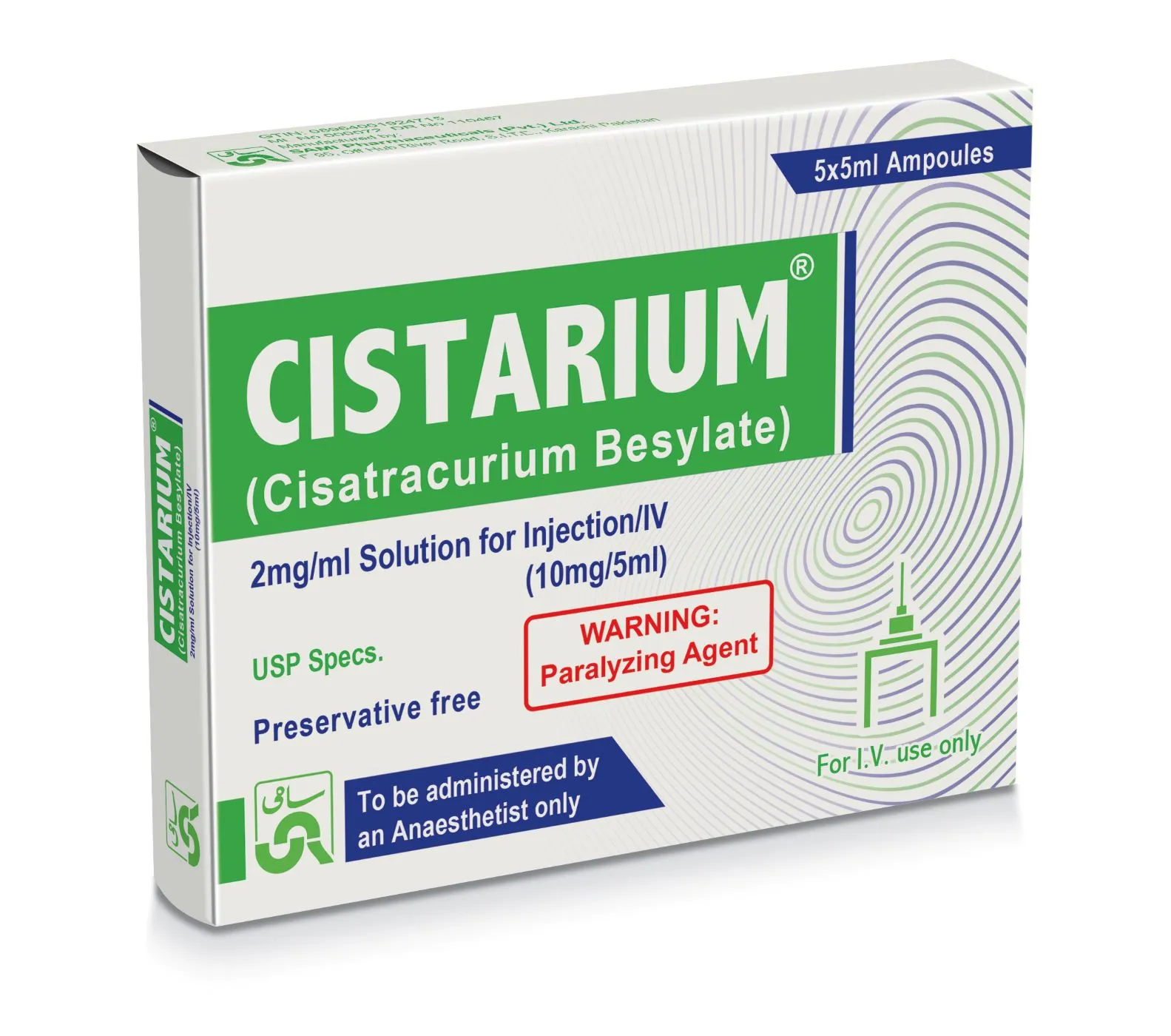Description
Cistarium (Cisatracurium Besylate) 10mg/5mL IV Injection
Description:
Cistarium is a sterile, non-pyrogenic solution containing cisatracurium besylate, a non-depolarizing neuromuscular blocking agent used intravenously to induce skeletal muscle relaxation. It is commonly administered during surgical procedures under general anesthesia and in intensive care units (ICU) for mechanical ventilation. Cistarium is characterized by an intermediate onset and duration of action, making it suitable for various clinical settings.
Dosage and Administration:
- Adult Dosing:
- Initial intravenous bolus: 0.15–0.2 mg/kg.
- Maintenance doses: 0.03 mg/kg every 30–60 minutes, adjusted based on clinical response.
- Continuous infusion: 3–5 mcg/kg/min, titrated to maintain desired level of neuromuscular blockade.
- Pediatric Dosing (2 years and older):
- Initial intravenous bolus: 0.1–0.15 mg/kg.
- Maintenance doses: 0.03 mg/kg every 30–60 minutes, adjusted based on clinical response.
- Continuous infusion: 3–5 mcg/kg/min, titrated to maintain desired level of neuromuscular blockade.
Note: Dosing adjustments may be necessary for patients with hepatic or renal impairment.
Indications:
- Facilitation of tracheal intubation during general anesthesia.
- Skeletal muscle relaxation during surgical procedures.
- Muscle relaxation during mechanical ventilation in the ICU.
- Adjunct to general anesthesia in pediatric patients aged 2 years and older.
Contraindications:
- Hypersensitivity to cisatracurium or any component of the formulation.
- Use of the 10 mL multiple-dose vial containing benzyl alcohol is contraindicated in neonates and low birth-weight infants due to the risk of toxicity.
Warnings and Precautions:
- Residual Paralysis: Patients with neuromuscular diseases may have prolonged effects.
- Benzyl Alcohol Toxicity: Monitor cumulative exposure in neonates and low birth-weight infants.
- Seizure Risk: Monitor for signs of seizures during prolonged administration.
- Hypersensitivity Reactions: Anaphylactic reactions have been reported; appropriate emergency measures should be available.
- Medication Errors: Accidental administration can cause death; ensure proper labeling and administration practices.
Drug Interactions:
- Inhalational anesthetics, antibiotics, local anesthetics, magnesium salts, and other neuromuscular blockers may potentiate or prolong the effects of cisatracurium.
- Anticonvulsants like phenytoin and carbamazepine may shorten the duration of neuromuscular blockade.
- Monitor neuromuscular function and adjust dosing accordingly.
Adverse Reactions:
- Common: Hypotension, bradycardia, flushing, rash, and bronchospasm.
- Serious: Anaphylaxis, prolonged paralysis, and respiratory depression.
Storage:
- Store at 20–25°C (68–77°F); excursions permitted to 15–30°C (59–86°F).
- Protect from light; do not freeze.
- Discard unused portion.
Conclusion:
Cistarium (Cisatracurium Besylate) 10mg/5mL IV Injection is an effective neuromuscular blocking agent used to facilitate tracheal intubation and provide muscle relaxation during surgical procedures and mechanical ventilation. Its intermediate onset and duration of action make it suitable for various clinical applications. Proper dosing, monitoring, and awareness of potential interactions and adverse reactions are essential for safe and effective use.



Reviews
There are no reviews yet.